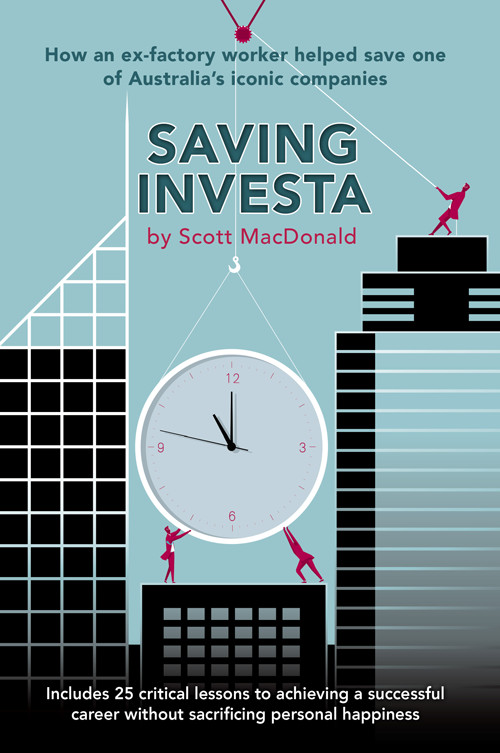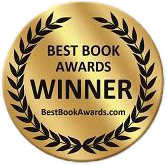Saving Investa


What Others Are Saying
"A fascinating read… I particularly enjoyed the interwoven stories of family and past experiences which ground your strong leadership skills. Your ability to lead people through massive changes and find creative solutions to the thorniest and biggest problems is amazing. I am so glad you wrote your story."
—Lynn Thurber, Chairman LaSalle Management Company
Scott has given us a rare insight into his life and his journey to date, culminating in an insider’s view into a $6.5 billion Australian company on the verge of collapse as it is caught in the throes of the storm presented by the global financial crisis. Being of a size that was “too big to fail,” we get an insight into the machinations across the globe as Investa crosses the many hurdles on its way to its eventual redemption through hard work, a committed team, deal making and a good dose of luck. It is a narrative which resonates with many of the headlines of today and reminds us of the cycles of the financial world that impacts all of us. It reinforces that in the end, it is the people who really do make the difference."
—David Baffsky, Chairman Ariadne, Honorary Chairman Accor Asia Pacific
"Scott MacDonald’s gripping account of his five-year effort to steer a multi-billion dollar Australian company through the Global Financial Crisis had me up late turning the pages. I was in deep suspense as each challenge arose, and then was resolved through Scott’s creative and wise leadership. The book is full of useful lessons for any business leader to draw from in other situations, and the Investa case study will also be of great relevance to business students who want to know what lies beyond their MBA’s."
—Niels Marquardt, U.S. Ambassador (Ret), CEO American Chamber of Commerce in Australia
How an Ex-factory Worker Helped Save One of Australia’s Iconic Companies
It was the biggest investment in the history of Morgan Stanley’s $100 Billion real estate fund business; it was one of the largest deals in the history of Australian property. In 2007, Morgan Stanley bought Investa Property Trust for more than $6.5 billion. In less than a year, the investment was in trouble.
Scott MacDonald, an American CEO with no prior experience in Australia, agreed to meet with the Company and Morgan Stanley executives in Sydney for one week in 2008. He returned home more than five years later after guiding Investa through its perilous journey to survival.
The Company moved from crisis to crisis from 2008 through 2012, sometimes avoiding insolvency by hours. The drama of corporate survival is played against the backdrop of the Global Financial Crisis.
The story of corporate struggle draws upon Scott MacDonald’s personal experiences as chapters alternate between his life growing up and the fight to save Investa.
Click below to buy your copy from these fine retailers:
Official Kirkus Review:
A retired CEO weaves memoir, management philosophy, and career advice in this well-crafted debut.
MacDonald, a specialist in corporate real estate, draws the title from his capstone assignment—rescuing Australia’s largest property company, Investa, from collapse during the global financial crisis. His saga began in 2008, six months after Morgan Stanley took Investa private in an ill-timed, highly leveraged $6.5 billion buyout. He accepted a six-month stint in Australia that turned into five years of organizational scrambling and nick-of-time refinancing to avoid insolvency. He saved the company but lost his marriage. Alternating chapters backfill his biography, connecting decisions at Investa with lessons from his hardscrabble childhood, teenage factory jobs, college struggles, military service, and “globe-trotting” rise to the boardroom. MacDonald turns the same eye for detail that scrutinized balance sheets to rendering scenes. The volume of tangential, personal details could have shrunk his potential readership to his
grandchildren, but he is an adept storyteller with a colorful past. Poignant, well-told recollections keep the reader engaged. MacDonald’s writing, like the management style he chronicles, is deliberate and nuanced, not flashy. Understatement and pacing magnify inherent tensions, as in a passage describing three executives awaiting a bank decision on renewing a $650 million loan: “The loan would mature the next day. I asked Jonathan at exactly what time; after checking the documents, he told me 11 a.m. No one had ever asked him before at precisely what time of day a loan matured.” MacDonald draws his characters concisely. A chief financial officer is “a quiet guy, the type who knew all the answers but was reticent to disclose any.” An Australian banker speaks in “an earthy vernacular, reflecting his early days as a union organizer and Labor Party activist.” In closing, he summarizes 25 key lessons, emphasizing teamwork, ethics, win-win solutions, decentralized decision-making, open communications, and respecting workers. None are entirely original, but his life experiences elevate platitudes to practical guidance. MacDonald puts a compassionate face on the CEO stereotype and reveals real people, not caricatures, caught in the executive-suite dramas spawned by the financial crisis.
For business readers, this insider’s tale informs and entertains.


